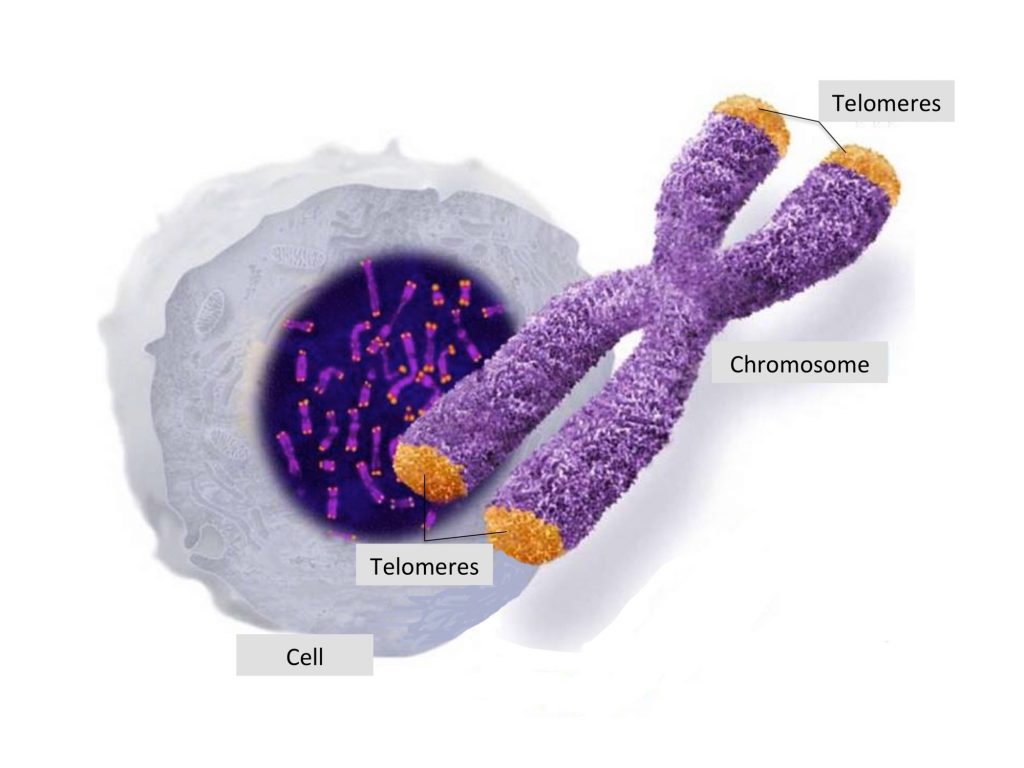Telomeres are the protective caps at the ends of chromosomes that help maintain the integrity of our DNA during cell division. They consist of repetitive DNA sequences and associated proteins.
Each time a cell divides, its telomeres become shorter. Eventually, the telomeres become too short, and the cell can no longer divide. This process is thought to contribute to the aging of cells and the body.

Telomerase is found in high levels in germline cells (egg and sperm) and stem cells. So there is something to it as a marker of health, although the exact mechanism of how it impacts multiple layers of health is still debated.
The length of a telomere is arguably a marker of aging
Telomeres are DNA timers that limit the lifespan of a single cell. On the individual cell level, telomeres are the best marker of aging. However, we are composed of trillions of cells and each of them has different age and expected lifespan. Some studies show that there may be some importance on the telomere side of aging for the immune system. Another recent large study concluded that telomere tests are not a good predictor of age-related health status.
At one time Telomere testing was considered the gold standard of age assessment. It could still be considered an important test but now there are other tests that may give us a better picture of aging.
Telomere length as a biomarker of aging for individual cells
Telomere length is a good predictor of cell health because telomeres play a crucial role in maintaining the integrity of our DNA. As cells divide, the telomeres become progressively shorter. When the telomeres become too short, the cell may become senescent or undergo programmed cell death (apoptosis). Therefore, telomere length is often used as a marker of a cell’s biological age, with shorter telomeres indicating a more advanced state of cellular aging.
Overall, on an individual cell level, telomere length is a good predictor of cell health because it reflects the cell’s ability to maintain the integrity of its DNA and to continue dividing. Cells with shorter telomeres are more likely to be senescent or undergo apoptosis, which can contribute to aging and disease.
Telomeres and the immune system
A recent large study concluded that telomere tests are not a good predictor of age-related health status. It is an important test but now there are other tests that may give us a better picture of aging. Telomere aging can directly affect the immune system. The younger your immune system the better equipped you are to fight off diseases. There are studies demonstrating V-cells can make the immune system younger (V-cells are Very Small Embryonic Like Regenerative cells).
Telomere length has been associated with a number of diseases and conditions, including cancer, cardiovascular disease, diabetes, and dementia. Shorter telomeres have been linked to an increased risk of these diseases, suggesting that maintaining telomere length may be important for overall health and disease prevention.
Telomeres and cancer
In addition, telomeres play an important role in cancer. Cancer cells are able to maintain their telomeres and continue dividing indefinitely, which is one of the hallmarks of cancer. Scientists are studying telomeres as a potential target for cancer treatments.
Overall, telomeres are important because they help protect our DNA and regulate cell division, and their dysfunction has been linked to aging and cancer.
Telomerase and cell life extension
Telomerase is an enzyme that can rebuild telomeres by adding DNA sequences to the ends of chromosomes. Telomerase is particularly active in stem cells, which have the ability to divide and differentiate into different types of cells. It is also active in some cancer cells, which allows them to continue dividing and growing.
Telomerase works by adding repetitive DNA sequences to the end of the chromosome, effectively lengthening the telomere. This process can help prevent the loss of genetic information during cell division and can allow cells to continue dividing for longer periods of time.
Researchers are exploring the potential of telomerase as a therapy for aging and age-related diseases. However, there are also concerns that telomerase activation could increase the risk of cancer by allowing cells to divide uncontrollably. Therefore, much more research is needed to fully understand the effects of telomerase on the aging process and on cancer.
Individual differences in telomere length
Women have, on average, longer telomeres than males, a difference that is already present at birth.
Research has shown that women tend to have longer telomeres than men, and this difference is thought to be related to differences in hormone levels between the sexes. Estrogen, for example, has been shown to protect telomeres from shortening, whereas testosterone may accelerate the process. As a result, women may experience slower telomere shortening and, on average, have longer telomeres than men.
Regarding female dizygotic (fraternal) twins, it is possible that the longer telomeres in one twin compared to the other may be due to genetic differences. However, this is not always the case, and environmental factors can also play a role. For example, if one twin is exposed to more stress or experiences a less healthy lifestyle, they may experience more telomere shortening than the other twin, leading to a difference in telomere length.